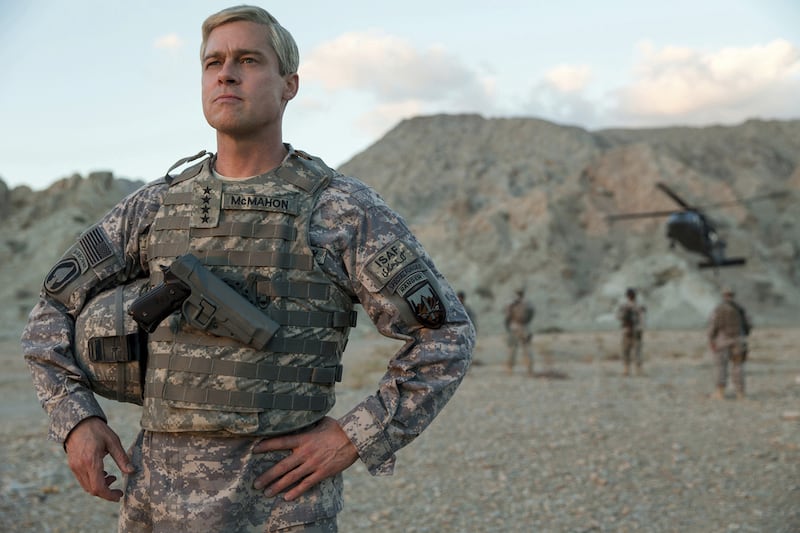Almost two years after Brad Pitt and his crew touched down in Abu Dhabi for the month-long shooting of David Michod's Afghan war satire War Machine in the capital and Ras Al Khaimah, the movie finally hit our screens on Friday, May 27.
It isn't the streaming giant Netflix's first foray into feature films – that honour fell to 2015's critically acclaimed, Idris Elba-starring Beats of No Nation - while Ricki Gervais and Adam Sandler are among other big stars to have appeared in Netflix's movie portfolio to date.
It is, however, one of the most eagerly anticipated films from Netflix, and not just by audiences keen to do a bit of UAE-landmark spotting, or the 2,000 or so local extras keen to catch a glimpse of themselves on the (small) big screen.
With a $60 million (Dh240 million) budget, the film may not be quite on blockbuster level, but for what would in the past have classed as a ‘made for TV’ movie, the figures are impressive, and when it comes to Hollywood big guns, they don’t come much bigger than Pitt, and a supporting cast including the likes of Ben Kingsley and Tilda Swinton.
So what is the verdict? Location spotters aren’t given too much to do. The movie opens and closes in Abu Dhabi Airport, though as a location it’s not exactly critical to the narrative, merely a place where our protaganists arrive in the region.
The other UAE locations are mostly military bases, or areas dressed up to resemble Afghan villages. The only factor that really distinguishes a military base in Abu Dhabi from one in Siberia is the weather, so sadly not too much eye-spy to play there.
There is a nice dramatic shoot out section towards the end of the movie where the audience is taken on a lengthy tour of the dusty back streets of Ras Al Khaimah’s old town, though the crumbling buildings and tethered goats don’t offer up too much in the way of noticeable landmarks.
The movie itself, meanwhile, is worth a look. Pitt plays US General Glen McMahon, the fictional chief of coalition forces in Afghanistan, and heavily based on his real-life counterpart General Stanley McChrystal – the film is based on journalist Michael Hastings’ account of McChrystal’s time in Afghanistan The Operators.
McMahon arrives in Afghanistan fresh from his successes in Iraq, but the situation in Afghanistan is an entirely different one. There’s no foreign army to fight, the coalition forces are more like a schoolyard full of squabbling kids than a finely oiled military machine (“this country won’t fight at night, this country won’t fight in the snow, this country wants to do caounter-narcotics, this country won’t do counter-narcotics”), and McMahon spends more time dealing with PR consultants and politicians than he does soldiers.
He’s very much an old-world general in a new-world war, though he’s by no means stupid – he’s smart enough to leak his own demands for a massive troop build up to the media when political necessity has led to The Whitehouse burying it, but equally tunnel-visioned enough to forget to check which room his wife’s in and go and say hello during a support-gathering trip to Paris.
The movie pulls no punches in its efforts to portray the futility of the whole ongoing Afghan debacle. It opens with a cynical monologue about the ridiculousness of America’s claims to bring peace and democracy to the world, and spends the next two hours making sure we don’t change our mind about that point of view.
Credit must be given to Netflix for its determination to shake up the TV and movie environment - the film is so relentless in its criticism.
There’s no shortage of movies about the futility of war out there, but there’s usually an underlying sense of at least individual heroism, or brave man doing his best in the face of a corrupt political establishment. There’s no sense here that things could be different with a few tweaks and none of the lead characters seem to have any redeeming features. It’s hard to see a movie so bleak coming through the studio system, or pretty much anywhere other than Netflix.
For all the bleakness, there’s plenty of dark humour too. Kingsley is standout as Afghan president Hamad Karzai, a man so convinced of the futility of his own task that he’s more bothered about connecting up his new blu-ray player than facing the impossible task of fixing his broken country – it’s a shame the veteran actor doesn’t get more screen time.
It’s a shame the movie won’t get a cinema release, as its quality warrants one, but when you’re focused on breaking the rules of movie watching, why stand by tradition, so turn down the lights, turn up the volume, and embrace the new order as soon as you get chance.
War Machine was locally produced by twofour54 Abu Dhabi and is available now on Netflix.
cnewbould@thenational.ae





